Overview
Telehandler forklifts for rent represent a versatile solution tailored for lifting and moving heavy materials. These machines are extensively utilized across construction, agriculture, and manufacturing sectors, thanks to their extendable boom and remarkable adaptability. Renting these forklifts not only proves to be cost-effective but also provides access to advanced models that enhance operational efficiency.
Furthermore, it is crucial to prioritize operator training and routine maintenance, as these factors significantly contribute to safety and optimal performance.
Key Highlights:
- Telehandlers, or telescopic handlers, are designed for lifting and moving heavy materials with an extendable boom for greater reach.
- Key features include a hydraulic lifting system, a variety of attachments, and capability to operate on rough terrain.
- Common applications are found in construction, agriculture, and manufacturing, where telehandlers enhance efficiency and safety.
- Renting telehandlers offers flexibility, cost-effectiveness, and access to the latest models without significant capital investment.
- Safety considerations include operator training, pre-operation inspections, and adherence to load capacities and manufacturer guidelines.
- Routine maintenance is crucial for performance, involving regular inspections, fluid checks, and cleanliness to prevent operational issues.
Introduction
Telehandler forklifts have emerged as indispensable tools across various industries, providing unmatched versatility and efficiency for lifting and moving heavy materials. Their unique telescopic booms and adaptability to different attachments are revolutionizing task execution in construction, agriculture, and manufacturing.
As businesses evaluate the benefits of renting versus owning, critical questions arise:
- What are the genuine advantages of telehandler forklift rentals?
- How can companies ensure they are making informed decisions?
This article explores the essential characteristics, applications, and cost-effectiveness of telehandler forklifts available for rent, equipping readers with the knowledge necessary to enhance their operational capabilities.
Define Telehandler Forklift: Key Characteristics and Functions
A telehandler, also known as a telescopic handler, is an essential piece of machinery designed for lifting, moving, and placing heavy materials. Unlike conventional lifting machines, telehandlers feature a telescopic boom that extends both forward and upward, allowing for greater reach and height. Key characteristics include:
- A hydraulic lifting system
- A variety of attachment options such as forks, buckets, and lifting jibs
- The capability to operate on rough terrain—where telehandlers outperform standard forklifts
Commonly used in construction, agriculture, and industrial applications, telehandlers are indispensable for tasks requiring both lifting and precise placement of materials.
Telehandlers stand out for their adaptability; they can swiftly swap attachments, significantly enhancing on-site efficiency. This versatility is exemplified in the case study titled "Attachment Versatility," which highlights how telehandlers can perform various tasks without the necessity for multiple machines. Furthermore, their cost-effectiveness is evident, as they fulfill multiple roles, reducing the need for hiring diverse types of equipment, as discussed in the case study "Cost-Effectiveness of Telehandlers."
As the demand for skilled operators continues to rise, it is crucial to ensure that telehandler operators receive proper training. In regions like Sydney, where formal certifications are mandated, adherence to these standards is essential for maintaining safety and efficiency. This commitment to training underscores the significance of telehandlers in modern construction and industrial operations.
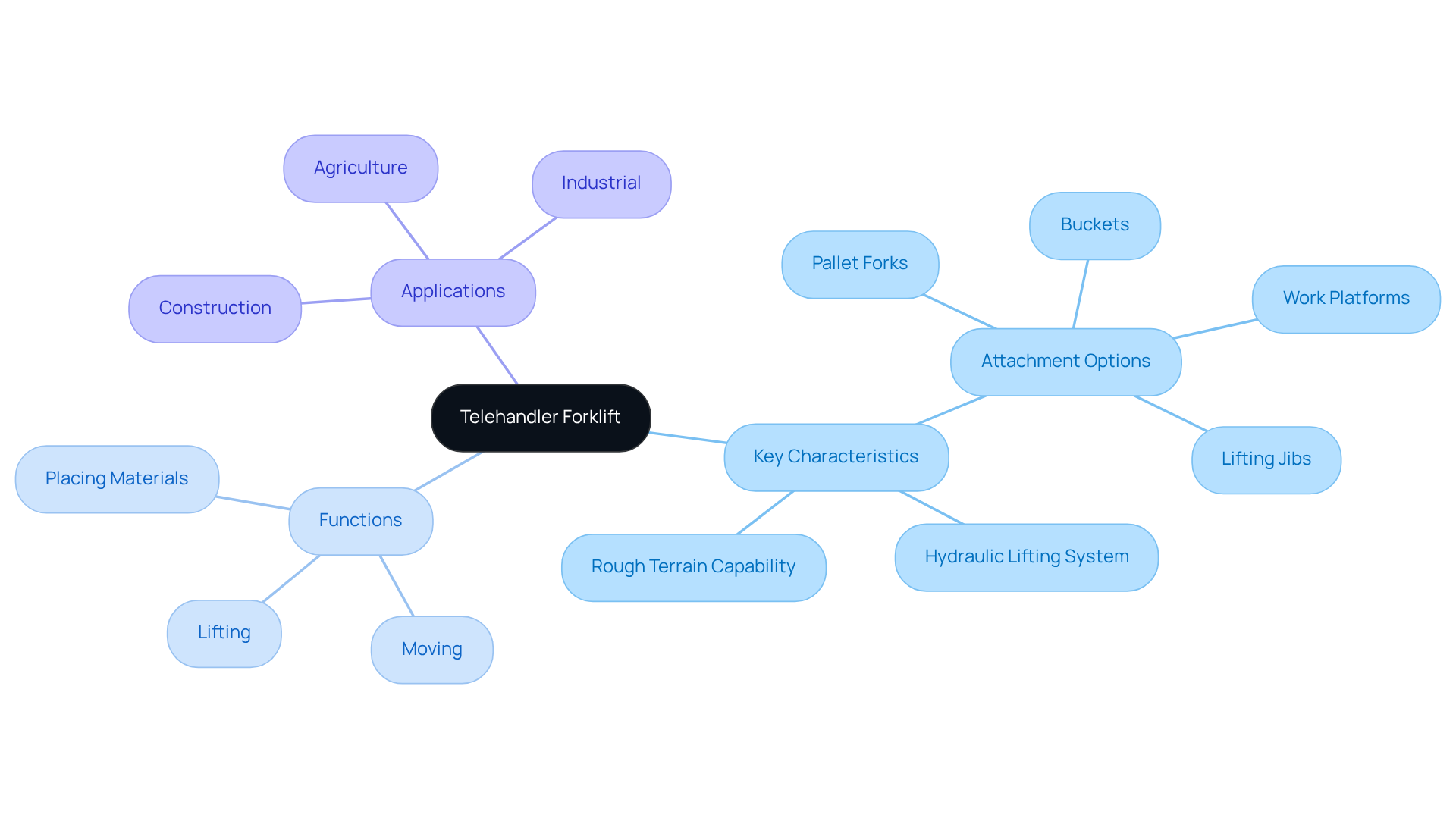
Explore Applications: Industries and Tasks for Telehandler Forklifts
Telehandler forklifts for rent play a pivotal role across diverse sectors, including construction, agriculture, and manufacturing. In the construction industry, using a telehandler forklift for rent is indispensable for lifting heavy materials such as steel beams, bricks, and concrete blocks to significant heights, ensuring projects proceed smoothly and efficiently. In agriculture, using a telehandler forklift for rent excels at tasks like moving bales of hay, loading feed, and transporting tools across uneven terrain, enhancing operational productivity. Furthermore, in manufacturing and warehousing, utilizing a telehandler forklift for rent facilitates the loading and unloading of goods, proving invaluable for logistics operations. The telehandler forklift for rent showcases adaptability to various attachments, empowering it to perform multiple tasks and significantly boosting efficiency and productivity on job sites.
The versatility of the telehandler forklift for rent is underscored by its ability to meet the unique demands of each sector. In construction, utilizing a telehandler forklift for rent enhances robust lifting capabilities, allowing for safer and more effective material handling, which reduces the risk of workplace injuries. In agricultural settings, the use of a telehandler forklift for rent facilitates easy navigation of rough terrain, ensuring that tasks are completed swiftly and allowing farmers to concentrate on their core operations. Additionally, in manufacturing, the use of a telehandler forklift for rent can facilitate seamless loading and unloading processes, streamlining logistics and resulting in time and cost savings.
Investing in a telehandler forklift for rent not only enhances operational efficiency but also showcases a commitment to quality and reliability. With their proven track record in various industries, telehandler forklifts for rent stand out as a smart choice for businesses looking to improve their productivity. Don't miss the opportunity to elevate your operations—consider using a telehandler forklift for rent in your equipment lineup today.
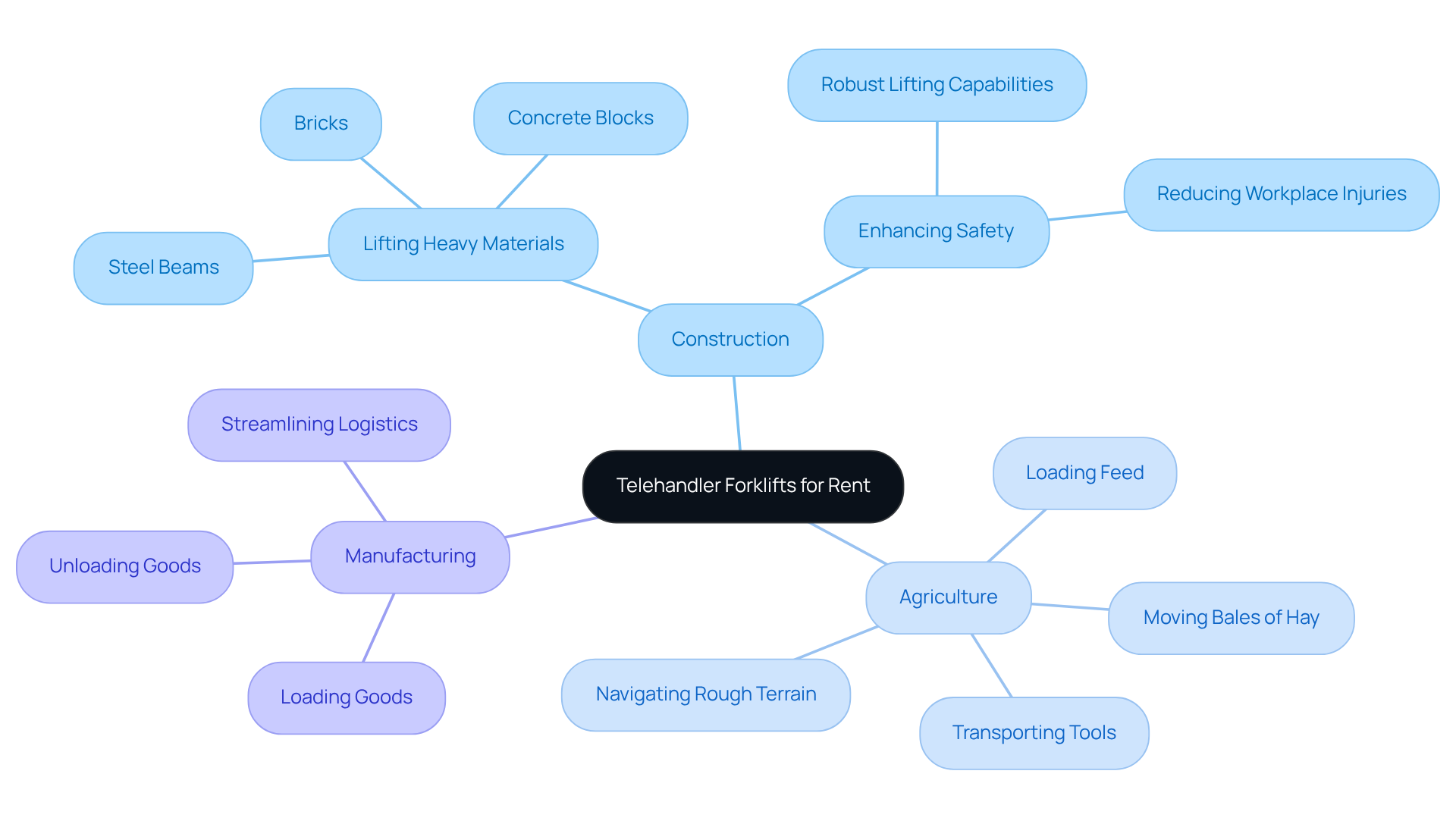
Evaluate Benefits: Cost-Effectiveness and Flexibility of Renting
Renting a telehandler forklift for rent presents a multitude of advantages, particularly for businesses seeking flexibility and cost-effectiveness. A primary benefit is the reduced initial investment; renting eliminates the need for substantial capital outlays associated with purchasing equipment. Additionally, lease agreements often include maintenance and support, allowing businesses to focus on their core operations without the burden of machinery upkeep. EZ Equipment Rental in Dallas offers competitive pricing options for a telehandler forklift for rent, ensuring that high-quality forklifts are accessible and affordable for companies of all sizes.
Moreover, renting provides access to the latest models equipped with cutting-edge technology and safety features, ensuring that businesses can operate both efficiently and safely. Leasing terms can be tailored to project timelines, enabling companies to adjust their equipment needs as necessary, thereby enhancing resource management. Significantly, many leasing firms offer tiered pricing based on lease duration, making long-term agreements more economical. Collaborating with local vendors like EZ Equipment Rental can further enhance the leasing experience, as they deliver personalized service and may offer reduced costs.
Optional attachments, such as fork extensions, can significantly boost job efficiency and are typically available for an additional fee. It is also crucial for businesses to understand insurance requirements, as leasing companies usually necessitate proof of insurance or provide a damage waiver for added protection. For instance, a construction company may opt to rent a material handler for a temporary project, allowing them to manage finances more effectively while still benefiting from top-tier equipment. Such flexible rental agreements are increasingly favored in 2025, empowering companies to maintain competitiveness in a rapidly changing market.
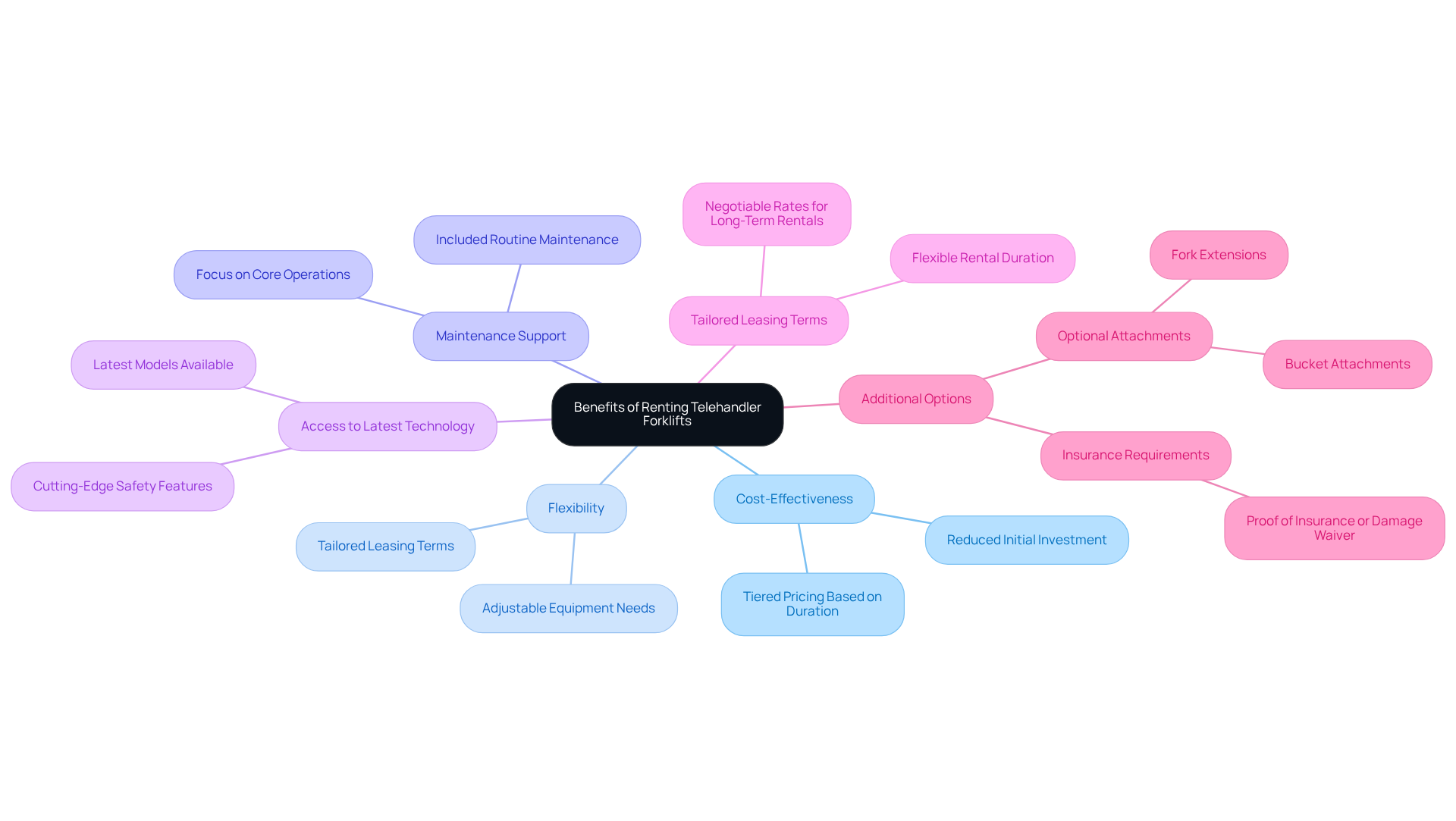
Safety Considerations When Using Telehandler Forklifts
Safety is paramount when operating lifting machines. Operators must be thoroughly trained and certified to fully comprehend the machine's capabilities and limitations. Key safety considerations include:
- Conducting pre-operation inspections
- Ensuring the load remains within the machine's capacity
- Utilizing appropriate attachments for specific tasks
- Remaining vigilant of surroundings, including overhead hazards and ground stability
Implementing robust safety protocols, such as wearing personal protective gear (PPE) and adhering to manufacturer guidelines, is essential for minimizing risks and fostering a safe working environment.
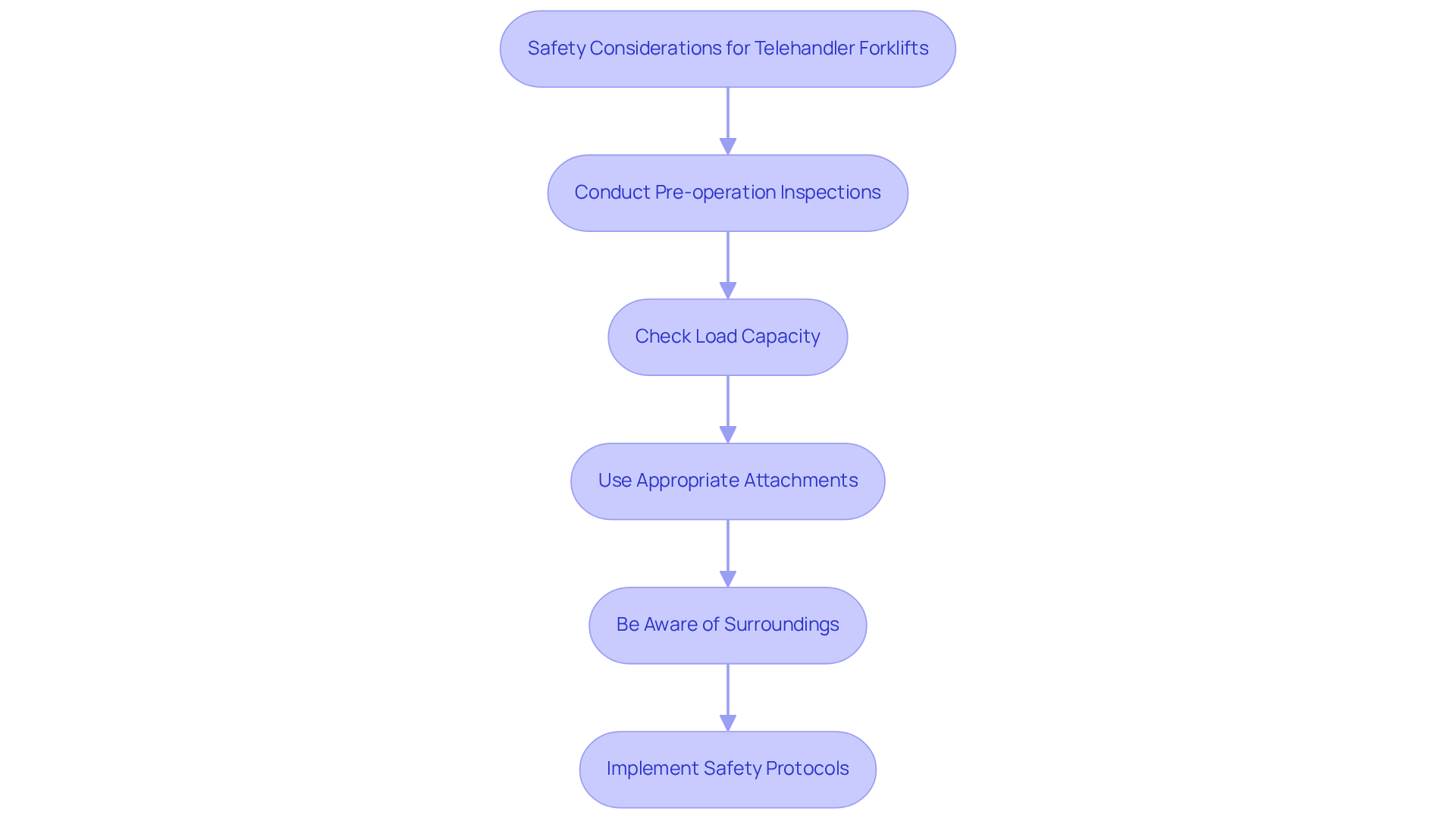
Maintenance and Care for Telehandler Forklifts
Routine upkeep is essential for guaranteeing the durability and dependability of rental machines from EZ Equipment Rental, which offers a diverse selection of well-maintained machinery. Operators must adhere to a maintenance schedule that includes:
- Regular inspections of hydraulic systems
- Tires
- Safety features
Checking fluid levels, such as oil and hydraulic fluid, is crucial for optimal performance. Furthermore, operators should clean the machine after use to prevent dirt and debris from impacting functionality. Keeping a maintenance log not only tracks service history but also helps identify potential issues before they escalate into significant problems. By prioritizing maintenance, operators can enhance the efficiency and safety of equipment operations, ensuring they benefit from the commitment to reliable machinery that EZ Equipment Rental provides in the DFW Metroplex. The specific features of our telehandler forklift for rent, such as their lifting capacity and maneuverability, make them ideal for a variety of construction needs.
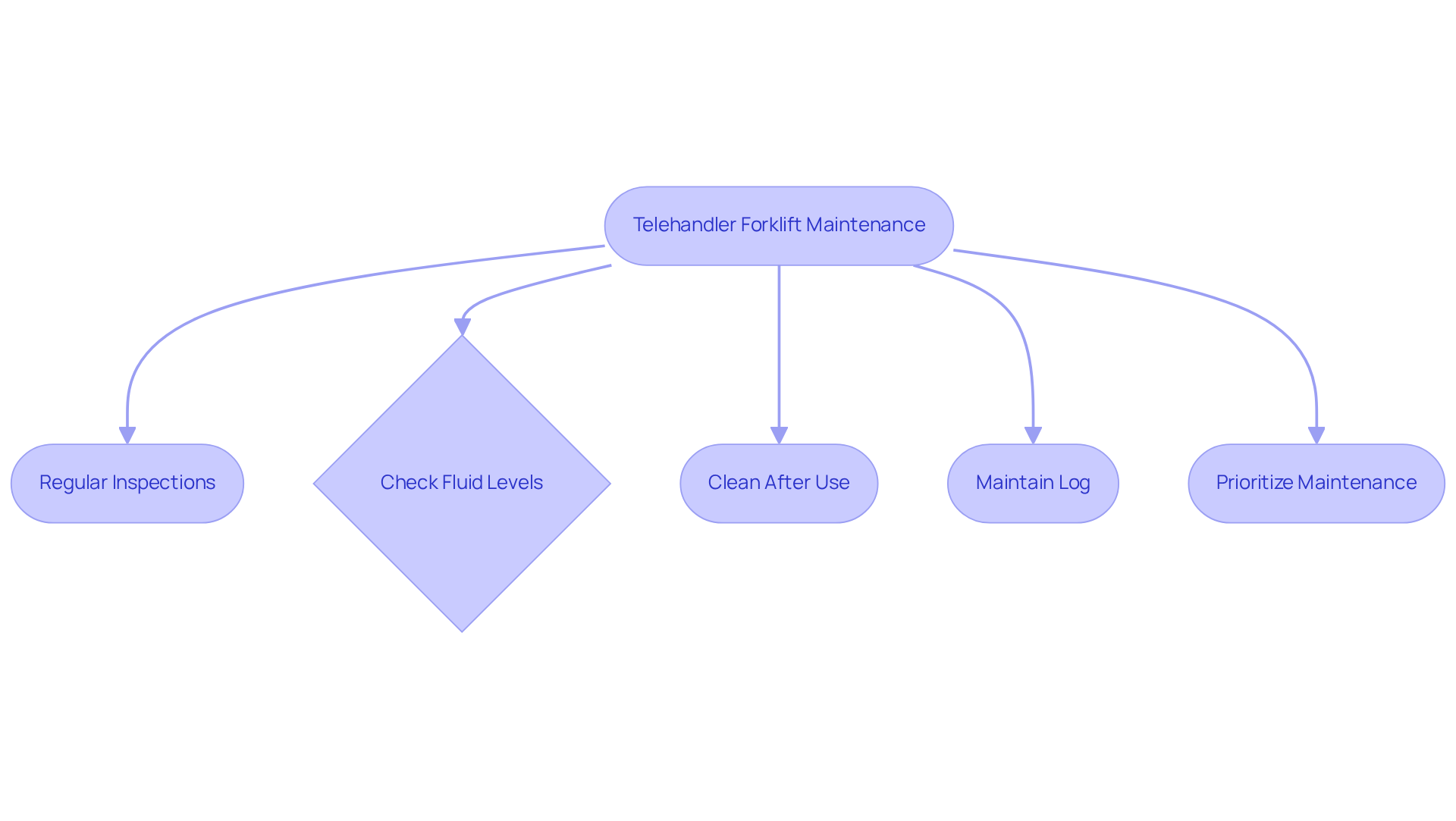
Conclusion
Telehandler forklifts signify a pivotal advancement in material handling, delivering unmatched versatility and efficiency across a multitude of industries. Their unique design, featuring a telescopic boom, empowers operators to lift and transport heavy materials with precision and ease. This makes them indispensable tools in sectors such as construction, agriculture, and manufacturing. Furthermore, the capacity to effortlessly switch between various attachments significantly amplifies their functionality, establishing telehandlers as essential assets for optimizing operational workflows.
Key insights have been shared throughout this article regarding the applications of telehandler forklifts in diverse sectors, underscoring their vital role in enhancing productivity and safety. The discussion has also shed light on the financial benefits of renting telehandlers, emphasizing reduced capital expenditure and access to cutting-edge technology. Additionally, the significance of adequate training and maintenance cannot be overstated, as these elements are crucial for ensuring safe and efficient operations.
In summary, adopting telehandler forklift rentals can greatly enhance operational capabilities while promoting cost-effectiveness and flexibility. As industries continue to evolve, the demand for adaptable and reliable machinery like telehandlers is poised to increase. Companies are urged to consider incorporating telehandler forklifts into their equipment roster, not merely for immediate needs but as a strategic investment in their future success. By making informed choices regarding equipment rentals, businesses can boost their productivity and sustain a competitive advantage in an ever-changing marketplace.
Frequently Asked Questions
What is a telehandler forklift?
A telehandler forklift, also known as a telescopic handler, is a piece of machinery designed for lifting, moving, and placing heavy materials. It features a telescopic boom that extends both forward and upward, providing greater reach and height compared to conventional lifting machines.
What are the key characteristics of telehandler forklifts?
Key characteristics of telehandler forklifts include a hydraulic lifting system, a variety of attachment options such as forks, buckets, and lifting jibs, and the capability to operate on rough terrain, which allows them to outperform standard forklifts.
In which industries are telehandler forklifts commonly used?
Telehandler forklifts are commonly used in construction, agriculture, and industrial applications.
How do telehandler forklifts enhance efficiency on job sites?
Telehandlers are adaptable and can swiftly swap attachments, allowing them to perform various tasks without the need for multiple machines. This versatility boosts on-site efficiency and productivity.
Why is training important for telehandler operators?
Proper training for telehandler operators is crucial to ensure safety and efficiency, especially in regions where formal certifications are mandated. This commitment to training highlights the significance of telehandlers in modern construction and industrial operations.
What are some specific applications of telehandler forklifts in construction?
In construction, telehandler forklifts are essential for lifting heavy materials such as steel beams, bricks, and concrete blocks to significant heights, ensuring projects proceed smoothly and efficiently.
How do telehandler forklifts benefit agricultural operations?
In agriculture, telehandler forklifts excel at tasks like moving bales of hay, loading feed, and transporting tools across uneven terrain, which enhances operational productivity.
What role do telehandler forklifts play in manufacturing and warehousing?
In manufacturing and warehousing, telehandler forklifts facilitate the loading and unloading of goods, proving invaluable for logistics operations and streamlining processes.
What are the advantages of renting telehandler forklifts?
Renting telehandler forklifts enhances operational efficiency, allows businesses to meet the unique demands of various sectors, and showcases a commitment to quality and reliability, making them a smart choice for improving productivity.




